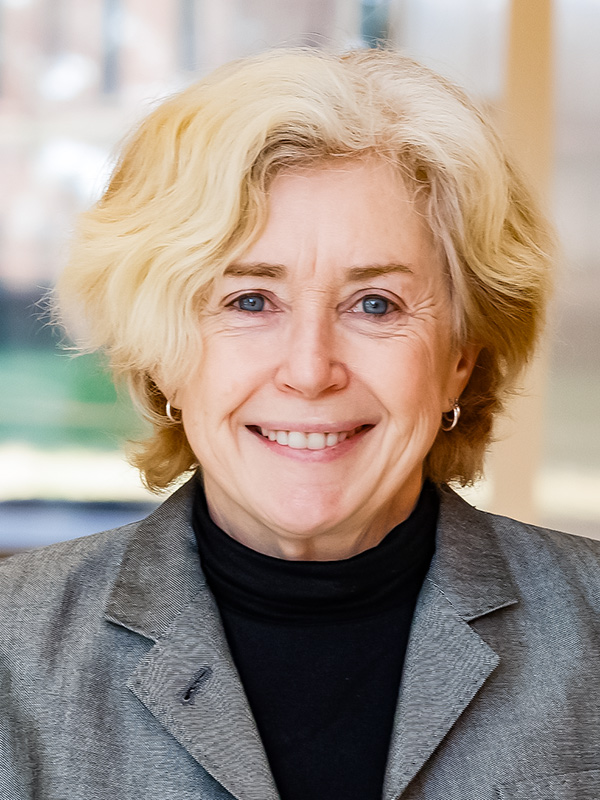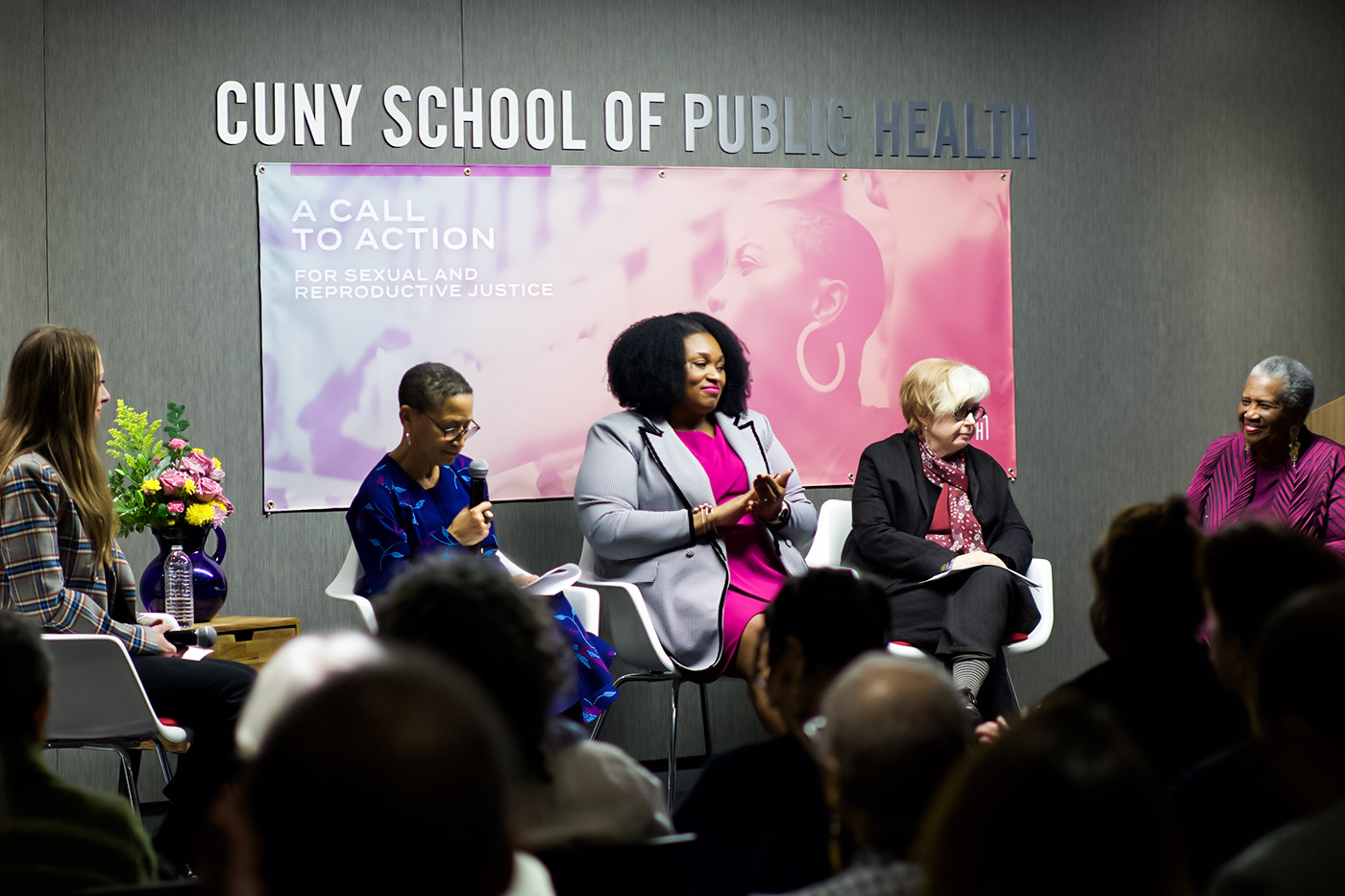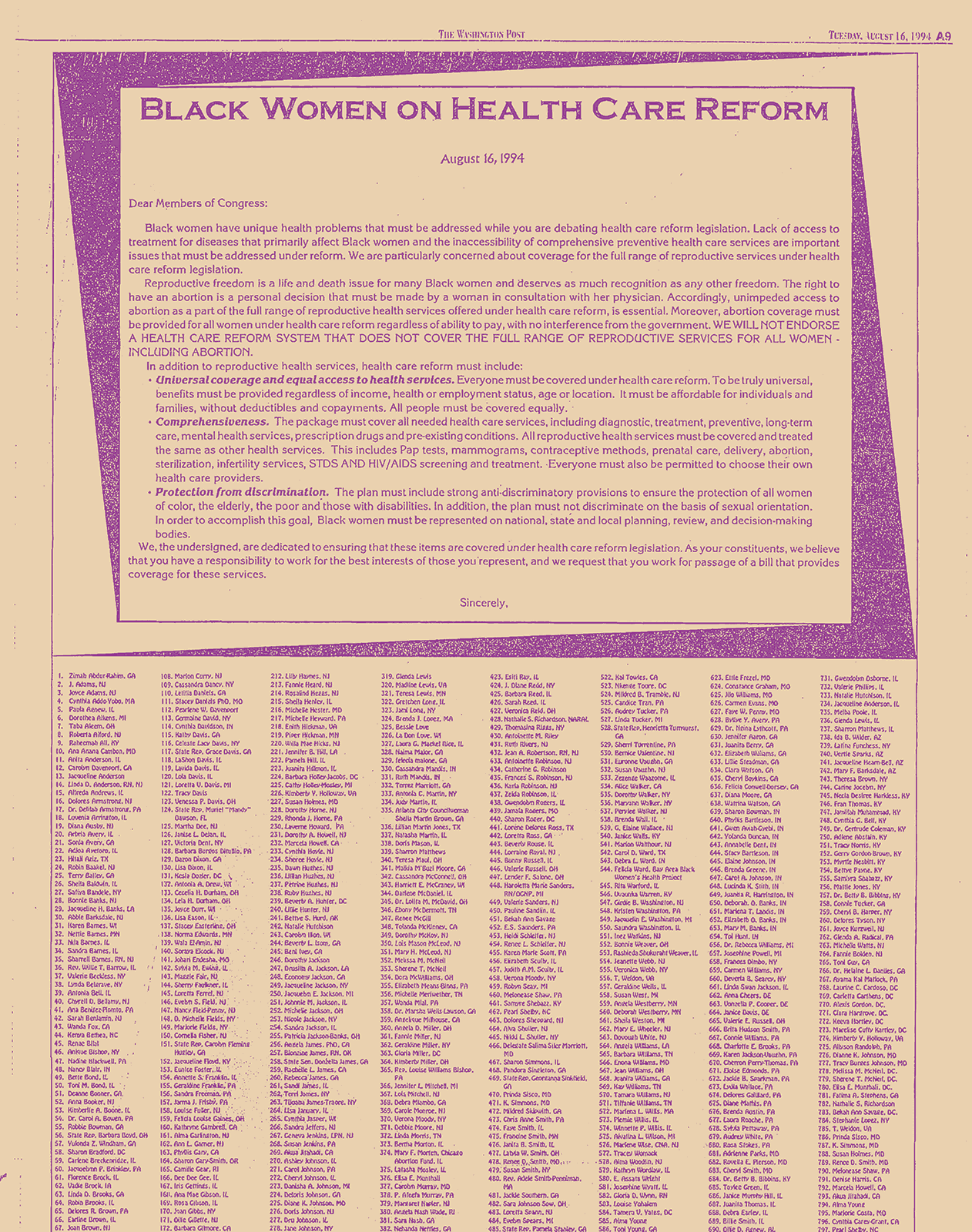Answer the Call to Action to Create the Nation’s First and Only Endowed Professorship in Sexual and Reproductive Justice
The Byllye Avery Sexual and Reproductive Justice Endowed Professorship
About the Professorship
The Byllye Avery Sexual and Reproductive Justice Professorship, the nation’s first endowed professorship in sexual and reproductive justice, will fortify CUNY SPH’s leadership in this area of public health. Named for the incomparable Byllye Avery, a trailblazer in women’s health, thought leader in reproductive justice, and founder of the Black Women’s Health Imperative, this professorship will be crucial in developing a sexual and reproductive justice curriculum at CUNY SPH, centering the very advocacy models Byllye Avery pioneered.
The endowed professorship will be housed within the Department of Community Health and Social Sciences at CUNY SPH. As an integral part of the department, this first-of-its-kind professorship will:
-
Advance cutting edge scholarship in sexual and reproductive justice by providing scholars with the resources necessary to conduct research and pedagogy that centers the experiences of Black women, Indigenous women, other women of color, and all minoritized and marginalized people
-
Train the next generation of activist-scholars to develop pedagogy and research informed by and grounded in sexual and reproductive justice
This assistant/associate level Endowed Professorship will be awarded to a scholar-activist who seeks to examine and advance sexual and reproductive justice by:
-
Expanding sexual and reproductive justice research and scholarship
-
Building a solutions based sexual and reproductive justice curriculum
-
Increasing access to culturally responsive sexual and reproductive health services both domestically and abroad
-
Preparing the next generation of public health leaders to advocate for and advance the human right to health
History of the Sexual and Reproductive Justice Movement
In June 1994, in the midst of national debates on health care reform, the term “reproductive justice” was first coined by a caucus of twelve Black women who were looking for a way to articulate the specific unmet needs of Black women facing multiple and intersecting forms of sexual and reproductive oppression that were not being addressed in the proposed health care legislation at the time. Connecting the terms reproductive rights and social justice, they decided to call themselves Women of African Descent for Reproductive Justice (WADRJ) and took out a full-page ad in the Washington Post and the Congressional newsletter Roll Call entitled “Black Women and Health Care Reform’’ that ultimately garnered signatures from 836 Black women. And with this seminal ad and a press conference on Capitol Hill that followed, the Reproductive Justice (RJ) Movement was born.1
For nearly three decades, RJ has been recognized globally as a critical framework grounded in Black feminist thought and human rights. While the theory, strategy, and practice of RJ have evolved over time, from the outset, the framework has been built in recognition of the need for an intersectional analysis defined by the human rights framework—based on the practice of self-help/community care—that would be inclusive and applicable to everyone. Most simply and elegantly stated, RJ has been defined as the human right “not to have children using safe birth control, abortion, or abstinence; the right to have children under the conditions we choose; and the right to parent the children we have in safe and healthy environments.”2 Since its earliest inception, the RJ framework was expanded to include the right to bodily autonomy free from any form of sexual or reproductive oppression.3 In a quest to avoid limiting its scope to issues of reproduction, the framework has evolved and is now more inclusively called Sexual and Reproductive Justice (SRJ).4
[1] Bond Leonard, TM. Laying the foundations for a reproductive justice movement. Radical Reproductive Justice: Foundations, Theory, Practice, Critique. New York: Feminist Press; 2017: 39-49.
[2] Ross L., Roberts L, Derkas E, Peoples W, Bridgewater Touré P. (Eds) Introduction. Radical Reproductive Justice: Foundations, Theory, Practice, Critique. New York: Feminist Press; 2017: 14.
[3] Ross L. Conceptualizing reproductive justice theory: A manifesto for activism. Radical Reproductive Justice: Foundations, Theory, Practice, Critique. New York: Feminist Press; 2017: 170-232.
[4] Diallo DD. HIV prevention and reproductive justice: A framework for saving women’s lives. Radical Reproductive Justice: Foundation, Theory, Practice, Critique. 2017:340-6.
Sexual and Reproductive Justice: Advancing Health Equity and Outcomes for Women of Color, Historically Marginalized Women, Their Families and Communities
SRJ is the “complete physical, mental, spiritual, political, social, and economic well-being of women and girls [and all people who can become pregnant] based on the full achievement and protection of women’s human rights.” The goal of SRJ is to advocate for and sustain the human rights of historically marginalized women, families, and communities in the United States and around the world to have the power and resources to maintain autonomy over their sexual and reproductive lives.
The SRJ framework recognizes that reproductive autonomy is intrinsically linked to the full breadth of social determinants of health and racial equity. Without equitable access to quality and safe healthcare, housing, education, environments, food, employment, and wages, there cannot be reproductive autonomy. SRJ acknowledges the harms of repeated divestment due to structural racism and the resulting inadequate, inequitable access to resources and physical, emotional, mental, and spiritual harm.
Breaking the Cycle of Health Inequities and Outcomes for Black Women
Women of color and marginalized women face extensive health disparities in teh United States. These disparities are starkest for Black women who suffer higher rates of many preventable diseases and chronic health conditions.
Black women face significant barriers to accessing sexual and reproductive health care and continue to be affected by ongoing legacies of structural racism.
IN THE UNITED STATES TODAY, BLACK WOMEN…
- Die from pregnancy related complications at 2.9 times the rate of white women
- Experience rates of preterm birth that are about 50% higher than those for births to white women
- Are more likely to be uninsured than their white counterparts; of those with insurance, 1 in 4 depend on federal and state programs that often limit coverage for sexual and reproductive health
When we support and invest in SRJ, we lift the whole of society.
Training a new generation of scholar activists
This professorship will build upon Byllye Avery’s model of scholar activism and empower a new generation of public health leaders to develop pedagogy and research informed by and grounded in SRJ, and all while dismantling the structural and environmental systems that stand as barriers.
CUNY SPH BODY OF WORK
- Audit of existing federal funding (NIH, EPA) available to study the role of environmental exposures in Black maternal and infant mortality to establish the need for additional targeted funding
- Analysis of maternal meconium samples to establish the role of metal mixtures associated with adverse child outcomes to inform prevention strategies
- Advocacy in city land use processes to require more accurate environmental impact statements and a showing of no harm prior to approving industrial sites in overburdened neighborhoods
- Investigation of the impact of the Dobbs decision on medical integrity
- Comprehensive review exposing migrants’ lack of access to sexual and reproductive health services
- Study to understand the integration of reproductive health services in primary care, including the role of long-acting reversible contraception (LARC)
- Assessment of safety-net health care utilization among uninsured immigrants in New York City
- Exploration of the establishment of a Wellness and Prevention Trust in Brooklyn, New York
- Qualitative study of East Harlem adolescents and their life goals in the context of personal relationships, risk of pregnancy, and sexually transmitted infections (STIs)
- State analyses of welfare family cap policies
- Large-scale mixed-methods evaluation of a physician training program for advocacy around abortion and other reproductive health issues
- Study of the intersectionality of racial and gender discrimination among teens exposed to dating violence
Ushering in a new Maternal, Child, Reproductive, and Sexual Health Degree at CUNY SPH
This endowed professorship will centralize SRJ programming, research, and scholarship at the school to usher in a new master’s degree in Maternal, Child, and Reproductive, and Sexual Health (MCRSH) as well as expand experiential learning opportunities for matriculated students. The MCRSH master’s program will focus on leadership development with an emphasis on challenging political environments and anti-evidence trends. This program will empower the next generation of public health leaders to dismantle barriers and proliferate justice.
Honoring Byllye Avery’s Legacy
Byllye Yvone Avery, a trailblazer in advancing global sexual and reproductive justice, has empowered Black women and girls across the world through her work to advocate for themselves by taking control of their health.
Born on October 20, 1937 in Waynesville, Georgia, Byllye Avery spent her formative years in DeLand, Florida. After studying psychology and completing her Bachelor of Arts at Talladega College in Alabama, she went on to earn a Master of Arts in special education from the University of Florida in 1969. In 1970, her husband suffered a massive heart attack at the young age of 33. His tragic death propelled her lifelong passion for improving health in the Black community.
Over the years, Byllye Avery became a fierce advocate for the sexual and reproductive health of Black women, co-founding the Gainesville Women’s Health Center, an abortion clinic, in 1974 and Birthplace, an alternative birth center also in Gainesville, Florida, in 1978. In 1983, she convened the first national conference on Black women’s health at Spelman College, a historically Black college for women, which over 2,000 women attended. Following the conference, Byllye Avery founded the National Black Women’s Health Project, now known as the Black Women’s Health Imperative (BWHI), the only national organization exclusively dedicated to improving health and wellness among Black women. The BWHI is still serving Black women and will celebrate its 40th anniversary in 2023.
In addition to her activism, Byllye Avery is a teacher and mentor. From 1991 to 1993, she was a visiting fellow at the Harvard School of Public Health. From 2003 to 2010, Byllye Avery co-led classes on reproductive health and advocacy in the Heilbrunn Department of Population and Family Health at Columbia University. Her work and mentorship continue to inspire and support the department’s commitment to affirm access to sexual and reproductive health as a human right.
Byllye Avery has served on the Charter Advisory Committee for the Office of Research on Women’s Health of the National Institutes of Health and has received numerous awards for her work, including the prestigious MacArthur Genius Award for Social Contribution, the Essence Award for Community Service, and the Audre Lorde Spirit of Fire Award from Fenway Health. She holds honorary degrees from Thomas Jefferson University, the State University of New York at Binghamton, Gettysburg College, Bowdoin College, Bates College, Russell Sage College, and Simmons University. In 2018, she received the University of California at San Francisco Medal, the institution’s most prestigious campus award. Byllye Avery is currently retired and working on her memoir. She lives in Provincetown, Massachusetts, with her wife of 35 years, Ngina Lythcott. They have three children and one grandchild.
Campaign Leadership
The Byllye Avery Endowment Campaign is led by Terry McGovern, Senior Associate Dean of Academic and Student Affairs at CUNY SPH, and an esteemed group of scholar-advocates.

Terry McGovern, JD
Senior Associate Dean of Academic and Student Affairs
Prior to joining CUNY SPH, Terry McGovern was the Harriet and Robert H. Heilbrunn Professor and chair of the Heilbrunn Department of Population and Family Health at the Columbia University Mailman School of Public Health. Prior to joining Columbia in 2002, McGovern served as senior program officer in the Gender, Rights, and Equality Unit of the Ford Foundation, where she oversaw global and domestic programming relating to HIV, gender, LGBT, and human rights. In 1989, McGovern founded the HIV Law Project, where she served as executive director until 1999. While there, she successfully litigated numerous cases against federal, state, and local governments including S.P. v. Sullivan, which forced the Social Security Administration to expand HIV-related disability criteria so that women and low-income individuals can qualify for Medicaid and Social Security benefits; and T.N. v. FDA, which eliminated a 1977 FDA guideline banning women of childbearing potential from early phases of clinical trials.
Susan Bernstein
Accomplished Ceramicist and Teacher
Linda Goler Blount
President & CEO, Black Women’s Health Imperative (BWHI)
Leslie Davidson
Professor of Epidemiology and Pediatrics, Columbia University Medical Center
Sally Deane
Adjunct Assistant Clinical Professor in Health Law, Policy, and Management, Boston University School of Public Health
Stephanie Y. Evans
Professor, Institute for Women’s Gender & Sexuality Studies, Georgia State University
Latanya Mapp Frett
President & CEO, Rockefeller Philanthropy Advisors; Adjunct Assistant Professor, Heilbrunn Department of Population and Family Health, Columbia University Mailman School of Public Health
Lyndon Haviland
President, Lyndon Haviland & Co.; Chairman, CUNY Graduate School of Public Health and Health Policy Foundation
Jordana Kier
Co-Founder, Lola; Chief Advancement Officer, Brooklyn Academy of Music, Board Director, CUNY Graduate School of Public Health and Health Policy Foundation
Nancy Krieger
Professor of Social Epidemiology, Department of Social and Behavioral Sciences, and American Cancer Society Clinical Research Professor, Harvard T.H. Chan School of Public Health
Shiriki Kumanyika
Research Professor, Community Health and Prevention, Drexel University Dornsife School of Public Health; Emeritus Professor, University of Pennsylvania
Regina Davis Moss
President and CEO, In Our Own Voice: National Black Women’s Reproductive Justice Agenda
Lynn Roberts
Associate Dean of Student Affairs & Alumni Relations and Assistant Professor, Community Health and Social Sciences, CUNY Graduate School of Public Health and Health Policy; Emeritus Founding Board Member of SisterSong
Diana Romero
Professor, Department of Community Health and Social Sciences and Director of the Maternal, Child, Reproductive and Sexual Health specialization, CUNY Graduate School of Public Health and Health Policy
Adrienne Torf
Composer, pianist, retired nonprofit finance consultant
Linda Villarosa
Journalist, author and contributing writer to the New York Times Magazine
Teresa C. Younger
President and CEO, Ms. Foundation

The endowment campaign kicked off on December 14, 2023 with a lively panel discussion moderated by Dr. Chelsea Clinton and featuring Byllye Avery, and attended by a gathering of SRJ leaders, activists, scholars, and friends. Click here to experience the event through our photo gallery.
Support the Endowment
We are raising a minimum of $4 million by May 2025 to endow the Byllye Avery Sexual and Reproductive Justice Professorship and invite visionary partners to join us. With your support, we can honor Byllye Avery through a new generation of sexual and reproductive justice scholar-activists advancing human rights for historically marginalized women, families, and communities.
Please contact Adam M. Doyno, Executive Director of the CUNY SPH Foundation to discuss giving options: adam.doyno@sph.cuny.edu
